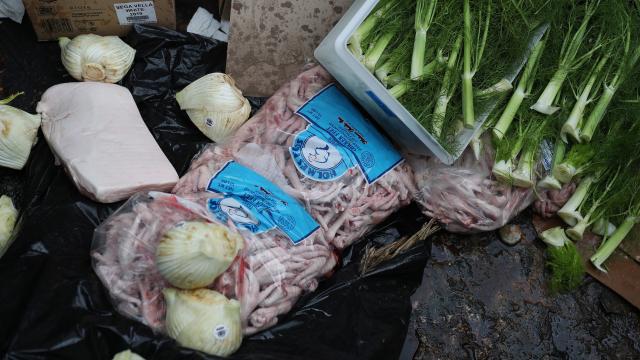If you’ve ever overstuffed your fridge and let some leftovers go bad in the back of it, you’re not alone. People toss more than 1 billion tons of food in the trash every year, according to a new United Nations report. But it doesn’t have to be this way.
A Thursday report by the UN Environment Program and the UK-based food charity WRAP found that in 2019, the world wasted 1.03 billion tons of food. That’s 17% of all the food the world produced that year, or enough to load up 23 million food trucks that would circle the Earth seven times if lined up bumper-to-bumper.
Nearly two-thirds of all food waste came from households. Another 26% came from food service waste, and 13% came from grocery stores and other retailers. The billion-ton total in the report doesn’t take into account food wasted earlier in the supply chain, like on farms and in factories. If you factor those in, the report estimates a third of all food gets tossed annually.
That sounds bad enough on it’s own, but when you also consider that 820 million people went hungry in 2019, it’s absolutely maddening. And to make matters worse, all this food waste is also feeding the climate crisis. It takes a lot of energy to grow and harvest crops and then transport, process, and package them, and when food rots in landfills it also produces methane, a greenhouse gas 80 times more planet-warming than carbon in the short term. The authors estimate that up to 10% of global greenhouse gas emissions are associated with food that is not consumed.
“If food loss and waste were a country, it would be the third biggest source of greenhouse gas emissions,” Inger Andersen, the Environmental Programme’s executive director, said. “Food waste also burdens waste management systems, exacerbates food insecurity, making it a major contributor to the three planetary crises of climate change, nature and biodiversity loss, and pollution and waste.”
Thankfully, we can fix this problem. The UN has set a goal for world leaders to cut the total amount of food waste in half by 2030. One way to help get there would be universalizing access to fridges in low-income countries. In India, for instance, roughly 70% of people don’t have refrigerators in their homes. One estimate suggests that an average of 23% of food production in developing countries is lost because of poor refrigeration.
Another strategy would be to change what we do with thrown-out food. In the state of Vermont and cities like Seattle and San Francisco, most food waste doesn’t go into trash, but to composting facilities. One analysis found that in the U.S., expanding composting could divert 9.5 million tons of food scraps from landfills every year, turning them into useful fodder for farmers.
Governments could also change how foods are labelled. In 2019, for instance, the Food and Drug Administration called on the food industry to stop labelling food with ““sell by” or “use before” dates, because those generally don’t correspond to when food will go bad, just when it will taste best. Instead, they urged manufacturers to use “best if used by” labels, which are more accurate.
There are individual changes we can make to reduce personal food waste, too. We can all learn to store our food better, start pickling or canning produce that’s on the brink of going bad, and use food scraps — like onion skins and carrot tops — to make broths or stocks (seriously!). We can also find new ways to make leftovers exciting. Those steps could all also help us save money by extending the life of our groceries.
But even all these good actions are unlikely to solve the problem of food waste altogether. Our capitalist food production system churns out food with an emphasis on increasing profit, not maintaining sustainability or wiping out hunger. To really get to the root of our food waste system, that’s what has to change.
